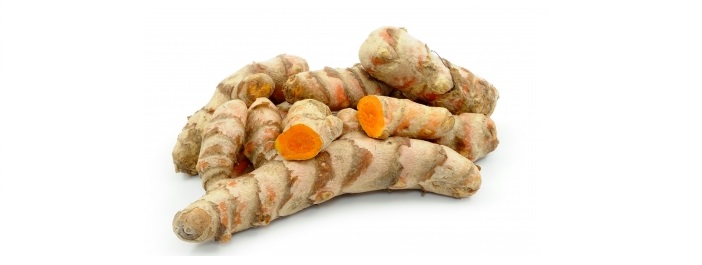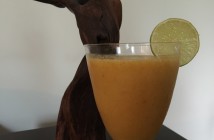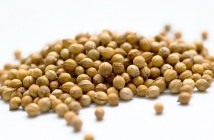It is not a surprise that turmeric is often mistaken for ginger, as they come from the same family and both share similar features of irregular shape and brown skin. The difference only becomes apparent when it is cut open or turned into powder, since turmeric has a deep yellow hue with a stronger and mustard-like scent.
In India, it is used in virtually any dish as a kitchen staple, but it was the health benefits of turmeric that made its reputation shot to stardom. What used to be a cheaper version of saffron is now considered Indian gold. Research showed that people in India that consume turmeric on a daily basis are less prone to chronic illnesses than those living in the United States and other Western countries. The healing power of turmeric is mainly attributed to its most active component, curcumin. Not only curcumin possesses an impressive array of anti-inflammatory and antioxidant properties, it also gives turmeric the yellow-orange color.
Taste and Aroma
Turmeric is distinguished by its slightly bitter, distinctly earthy with slightly pepper undertone. Bitter if used too much. Fresh turmeric is pleasantly milder and more complex than the dried or powdered varieties.
Pairing Spices
Allspice, caraway, cardamom, chili, cinnamon, cloves, coriander, fennel seed, fenugreek seed, garlic, ginger, lemongrass, mustard, paprika, parsley, tamarind, mint
Complements
Asian and Indian curries, Moroccan tagines, stir-fired chicken, seafood and vegetables, pickles, sauces, rich dishes
Culinary Uses
Turmeric Recipes
Turmeric is one of the ingredients used to make curry, yet give a dish its bright yellow color. When cooking with turmeric, however, it must be used at the right amount, especially that it has a strong flavor. However, a pinch is probably insufficient to make it stand out. Cooking with turmeric can only be considered an adventure, what with the variety of dishes that you can create with it, from savory to sweet treats. What is even more interesting is that nearly every part of turmeric has culinary uses.
- It can be added to vegetables, mashed cauliflower and grilled foods. Blend it with other spices and you can do magic with it.
- Use the plant leaf to make patoleo, an Indian leaf cake that is made of rice flour layered with a mixture of coconut and jiggery, a traditional cane sugar that is a concentrated product of cane juice, palm sap or date.
- Leaves are used to wrap and cook food, especially in some regions in India, as it imparts a distinctive flavor to the dish.
- It is used to give baked products, canned beverages, ice cream, yogurt, gelatins, yellow cakes, etc. a distinct yellow color and excellent taste.
- It is used as a starter ingredient in many Middle Eastern and South Asian dishes. In Iranian dishes, the powder is mixed with caramelized onions, while in South Africa; it is used to give white rice a golden yellow color.
Suffice to say that many countries all over the world have found culinary uses for this spice. A lot of Vietnamese cuisines use it to enhance the flavor of certain dishes as well as in soups and stir-fried recipes. In Thailand, turmeric is extensively used in soups, curries, stir-fries, and snacks. In Europe, during the medieval times, it is used to substitute the more expensive saffron.
Buying and Storing
You can find dried or ground turmeric in most supermarkets, spice or online stores, but fresh turmeric is usually available in Indian or Asian groceries. It is important that dried and powdered turmeric is stored in a cool, dry and dark place, and kept in a tightly sealed container. Fresh turmeric rhizomes, if kept dry with paper towels, can last several months in the refrigerator.
Health Benefits
The rich and diverse anti-inflammatory and antioxidant actions in turmeric curcumin have been shown to be vital to virtually every organ in the body. With more than 50 preventative and curative attributes, turmeric can be used to prevent, relieve, and treat many health conditions:
- Alzheimer’s disease: Since brain inflammation is one of the causes of Alzheimer’s disease, turmeric aids in the overall health of the brain by removing plaque buildup and improving oxygen flow in the brain.
- Arthritis: With Turmeric’s antioxidant property, it is able to destroy free radicals that damage body cells. It is also great for both rheumatoid arthritis and osteoarthritis due to its anti-inflammatory properties.
- Asthma: The curcumin in Turmeric has an anti-inflammatory action that helps relieve tightness of the chest and inflammation of the air ways that is often linked with asthma. It can be used as treatment in many ways, including mixing it with hot water.
- Cancer: Turmeric is found to be one of the best in protecting us from the development or the advancement of cancer cells. It can help prevent breast carcinomas, colon carcinomas, prostate cancer, and various types of cancers. There are a number of research articles in the National Cancer Institute citing the turmeric effect in suppressing cancer growth.
- Cholesterol problems: By simply using it as food seasoning, turmeric can lessen cholesterol levels which leads to prevention of many cardiovascular diseases.
- Diabetes, type 2: Turmeric helps in moderating insulin levels and improves glucose control, making it an effective treatment for diabetic patients. It reduces insulin resistance which is also very helpful in preventing the onset of Type-2 diabetes.
- Gout: Gout sufferers rejoice! The curcumin in Turmeric has the ability to reduce the levels of two enzymes that cause your big toe to become inflamed. Research in China also showed that it can reduce the activity of the enzyme xanthine oxidase, which is responsible for the production of uric acid.
- Gum disease: Turmeric has been used to remedy oral ailments, including gingivitis. Its anti-inflammatory properties can provide relief of the inflammation of gum tissue.
- Heart disease: Curcumin in Turmeric is said to help prevent oxidization of cholesterol, which is the leading cause of plaque buildup and damage of the blood vessels. Without these conditions, heart disease can be prevented.
- High blood pressure: Because Turmeric can lower cholesterol and prevent buildup of plaque in the arteries, high blood pressure is well-maintained. Moreover, it prevents damage of the heart cells that is induced by blood pressure.
- Liver disease: As a liver detoxifier, turmeric helps it produce enzymes and increases these vital enzymes too. These reduce toxins in the body and also improve blood circulation.
- Overweight: By having one teaspoon of turmeric power in every meal, those who want to lose weight will be able to maintain ideal weight because turmeric increases the flow of bile that aids in breaking down of dietary fat.
- Parkinson’s disease: Researches showed that curcumin in Turmeric has the potential to inhibit the oxidative damage and inflammation that leads to Parkinson’s disease.
- anti-oxidant properties in Turmeric is believed to be beneficial in Parkinson’s disease. In a study conducted, flies given large doses of Turmeric was able to block dementia caused by Parkinson’s.
- Stroke: Curcumin can also help reduce the size of blood clots involved with the stroke caused by the a ruptured blood vessel in the brain.
- Skin – Acne, eczema, psoriasis: Turmeric has anti-viral and anti-bacterial properties, which is why it has been used as a topical ointment. It can also prevent localized inflammation, skin cancer, psoriasis and other similar skin conditions.
What are Turmeric Side Effects? Some people may experience diarrhea, which is ironic, considering that it can cure diarrhea. Others may also have stomach upset, or feel nauseous and dizzy. Overall, however, this amazing spice has no major side effects.
What about certain precautions? It is important to note that turmeric supplements should only be taken by mouth or applied to the skin no more than 8 months. Because folklore suggests that it was used for birth control, pregnant women are highly advised against taking it by medicinal amounts. It is also wise to stop using it when breastfeeding, because there is no information available regarding its safety rate when taken as a medicine under the circumstances.
Image courtesy of Sommai at FreeDigitalPhotos.net






